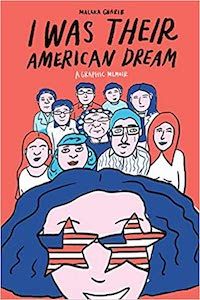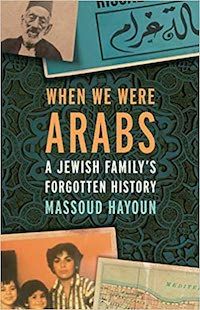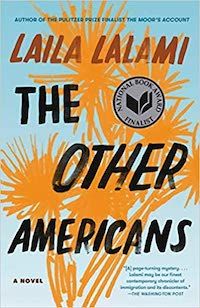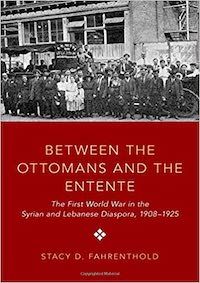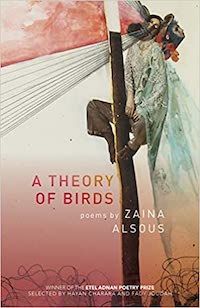For the first time in the prize’s history, a graphic memoir was among the winners. Filipino Egyptian American artist, journalist, and writer Malaka Gharib won the Children’s/YA category. She took the prize for I Was Their American Dream. Gharib’s graphic memoir is a coming-of-age that explores identity and culture in a household that’s Filipino, Egyptian, and American. She said, over email, that the award was particularly meaningful because “One of my deepest insecurities in life has been whether I was Arab enough.” One of the things AANM director Diana Abouali highlighted about this year’s entries was their increasing formal and cultural diversity. “The submissions this year reflected the increasingly rich variety and diversity of Arab American experiences,” Abouali said in a news release. One of this year’s nonfiction prizes also went to an author navigating multiple identities: debut author Massoud Hayoun. In his 2019 book When We Were Arabs: A Jewish Family’s Forgotten History, Hayoun gives an account of his grandparents’ lives in Egypt, Tunisia, Palestine, and Los Angeles. It is a work that weaves together personal narrative, history, and journalism in excavating his family’s Jewish and Arab identities. In the first chapter of his book, Hayoun writes: “My intention is to reclaim the Jewish Arab identity for me and to recuperate it as a stolen asset of the Arab world.”* Hayoun said, over email, that he was thrilled by the prize. “This is the only award that could possibly matter to me, as anyone who has read When We Were Arabs is well aware.”
Laila Lalami, Two Time Fiction Winner
One thing that wasn’t different with this year’s Arab American Book Award was the appearance of Moroccan American author Laila Lalami. She was also co-winner of the 2015 fiction prize. That year, she took the prize for her The Moor’s Account, a prize she shared with An Unnecessary Woman, by Lebanese novelist Rabih Alameddine. This year, Lalami took the prize for her acclaimed novel The Other Americans. That book is part family saga, part murder mystery, and part love story. Alameddine is the only other novelist to have won the AABA twice in the adult category. He also won in 2017 for his most recent novel, the glorious The Angel of History. Another two-time AABA winner is acclaimed author Naomi Shihab-Nye. She took the Children’s/YA prize in 2009 for her Honeybee: Poems & Short Prize. She followed with a win in 2015 for The Turtle of Oman. In the poetry category, Phil Metres has won the AABA twice: in 2012 (Abu Ghraib Arias) and in 2014 (A Concordance of Leaves). He was also a runner-up in 2016 (for his Sand Opera), and he co-won the nonfiction prize last year for his The Sound of Listening.
A Prize for Academic Work, Too
In addition to Hayoun’s When We Were Arabs: A Jewish Family’s Forgotten History, this year’s prize also rewarded two more nonfiction works. In contrast to Hayoun’s, these two works were directed at more academic audiences. Hayoun’s co-winner was Stacy D. Fahrenthold’s Between the Ottomans and the Entente: The First World War in the Syrian and Lebanese Diaspora, 1908–1925. This book was published last year by Oxford University Press. According to prize organizers, it “examines the politics of Syrian and Lebanese migration around the period of the First World War.” This year’s runner-up was Sherine Hafez’s Women of the Midan: The Untold Stories of Egypt’s Revolutionaries. Indiana University Press published the book last year, and it foregrounds firsthand accounts of women who participated in Egypt’s January 25 revolution.
A Growing Number of Prizes
For the first two years of the Arab American Book Awards, there was no poetry prize. It was first awarded to Suheir Hammad in 2009. This year, the top poetry prize went to Zaina Alsous’s A Theory of Birds. According to prize organizers, the poems “draw on inherited memory, historical record, critical theory, alternative geographies, and sharp observation. In them, birds—particularly extinct species—become metaphor for the violences perpetrated on othered bodies under the colonial gaze.” Alsous’s win also points to a growing breadth of Arab American book prizes, as the collection also won the Etel Adnan Poetry Prize in 2019. The Etel Adnan prize—named for the great Lebanese poet and painter—celebrates “a first or second book of poetry, in English, by a writer of Arab heritage.” It awarded its first prize in 2017. For this year’s Arab American Book Awards, the collection Invasive species by Marwa Helal also received an honorable mention.
Online Awards Ceremony Set for November
The Arab American National Museum remains closed in response to the pandemic. However, the annual Book Awards ceremony will still go forward. Instead of an in-person event, they will shift to an online platform. Organizers currently plan to hold the ceremony in November 2020. *Editor’s Note: Massoud Hayoun’s quote was corrected from the press release.
